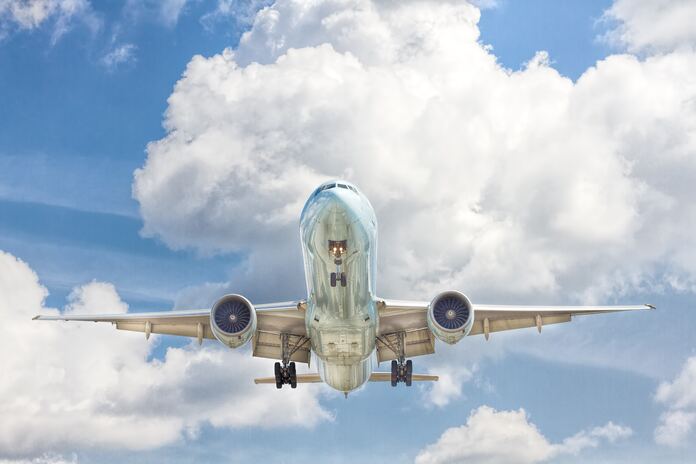Boeing Stock (NYSE:BA)
Investors are pleased with the comment made by Boeing CEO Dave Calhoun, who stated that the production of the 737 MAX is increasing.
According to Bloomberg, at the company’s annual meeting of shareholders, Calhoun predicted that the MAX manufacturing rate would be increasing in the very near future.
Implications for the Industry
The restart of manufacturing of the 737 Max has repercussions not only for Boeing but also for the whole aerospace industry. Because of its low fuel consumption and extensive flying range, this airplane was a favorite among airlines. Due to the impact that its grounding had on the industry, airlines were forced to cancel flights and search for other aircraft to fill the void left by the grounded planes.
As a result of the production line being restarted, airlines will soon be able to restart the process of acquiring airplanes and adding them to their fleets. As they work to recover from the effects of the COVID-19 pandemic, they will receive a lift from this, which is just what they need. Additionally, as a result of the additional safety features included in the 737 Max, passengers will have a higher level of confidence in the aircraft, which will lead to an increase in the demand for air travel.
Tuesday’s noon trade saw Boeing stock (NYSE:BA) increase by 1.3% to a price of $207.80. Since Mr. Calhoun spoke, the stock price has increased by around 2%. The S&P 500 and the Dow Jones Industrial Average each had a loss of approximately 0.2% and 0.3% respectively.
Since quite some time ago, MAX manufacturing has been a primary concern for investors. Wall Street anticipates that Boeing will deliver approximately 430 MAX planes in 2023; however, in order to meet this target, Boeing will need to produce north of 35 jets per month, which is an increase from the present rate of approximately 31 jets per month. Investors have expressed concern that 430 jets will not be able to be produced. Boeing delivered almost 390 MAX planes in 2022.
The investors have legitimate concerns for a variety of reasons. To begin, problems with the supply chain have been a headwind for the entirety of the aerospace industry. This is partly due to labor issues. During the pandemic, employees with years of relevant experience departed the aerospace value chain. Younger workers have started to fill in, but, to be honest, they are a little bit slower at this point in time.
Because of this dynamic, both General Electric (NYSE:GE) and Raytheon Technologies (NYSE:RTX) have had trouble meeting their engine production goals. In its partnership with Safran (SAF.France), General Electric (NYSE:GE) manufactures MAX engines. Pratt & Whitney, a part of Raytheon, is responsible for the manufacturing of engines. It has had a lot of trouble delivering engines to Lockheed Martin (NYSE:LMT) in order for them to use in the F-35 fighter plane.
Because of a problem with the supply’s overall quality, Boeing was also obliged to postpone the delivery of some MAX jets approximately a week ago. The comments made by Calhoun also provide an indication that the delay will be measured in weeks rather than months.
Over the past year, the price of Boeing stock has increased by around 15%, outperforming the S&P 500 by approximately 20 percentage points. The rebound of commercial air travel off the pandemic-induced lows has given investors reason for optimism that the trend will continue.
When Boeing releases its financial results for the first quarter on April 26, the shareholders will have another opportunity to question management.
Improved Precautionary Measures
The Boeing 737 Max has been subjected to numerous safety upgrades in order to address the faults that led to the two accidents that occurred. The Maneuvering Characteristics Augmentation System (MCAS), which has been upgraded to prevent the system from being activated by accident, is one of the key changes that has been made. In addition to this, the aircraft has received redundant sensors, which will supply the flight control system with data that is more trustworthy. In addition, the flight crew has received additional training to guarantee that they are able to efficiently respond to any emergency situation that may arise.
The restart of the manufacturing of Boeing’s 737 Max aircraft is a big step forward for both the company and the aviation industry as a whole. Because of the strengthened safety measures and the modifications made to the MCAS system, the problems that contributed to the two incidents have been resolved, making the aircraft both safer and more reliable. Now that the airplanes are ready to be delivered to customers, Boeing can concentrate on doing what it does best: bringing in revenue. The restarting of manufacturing can also be beneficial to the business because it will let airlines expand their fleets with aircraft that are more dependable and efficient in their use of fuel. The aviation industry as a whole will benefit from the revival of 737 Max manufacturing, which is a move in the right direction.
Featured Image: Unsplash @ John McArthur















